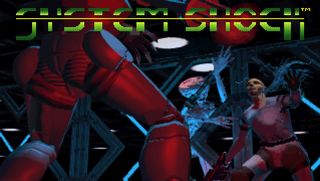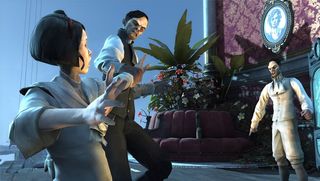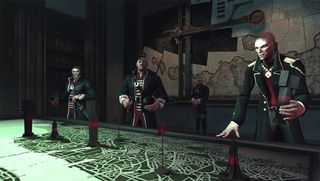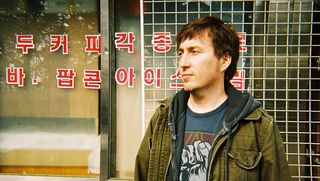Storytelling in games - Q&A with Dishonored co-creator
Let Harvey Smith regale you with tales of assassinations or funerals

Pixels or pages
Storytelling in games is more important than ever before. With phenomenal fiction told through games like Journey, The Walking Dead, and BioShock Infinite, each with their own distinct method, more gamers are finding that a strong narrative can be just as engrossing as enjoyable gameplay. When it comes to emergent narratives, Dishonored is the most recent example of excellent storytelling that responds to the player's improvisations and moral decisions. But Harvey Smith, veteran game designer and co-creative-director on Dishonored, isn't a one-trick pony.
Smith's new semi-autobiographical book, Big Jack is Dead, is a non-interactive chronicle of strained parental relations--all but the polar opposite of Dishonored's narrative structure. To find out more about the distinct challenges of weaving a book's story rather than a game's, we asked Smith to tell us more about this experiences as an author, both in novel and virtual form.

GamesRadar: What do you think is the paragon of storytelling in gaming?
Harvey Smith: To this day, the first System Shock by Looking Glass Technologies feels unbelievably cohesive, engaging to the player, and ahead of its time. Truly an under-appreciated master work. I got to support those guys as a tester, so I played the game for 10 months straight (working on the floppy then CD versions). It just never got old. There was the sense of place, so strong I used to dream about Citadel Station, before the disaster. Also, the emergent narrative and creeping player-driven pace made the experience so rich compared to most video games, which are more static, controlled and scripted. It's a highly subjective answer, but System Shock represents a great blend to me.

GR: Having written a book, what do you now appreciate more about telling a story in games?
HM: In games, I'm much more interested in interconnected game systems that enable the player to act creatively on the game environment, and the exploration of the environment at the player's own pace. That's one of the reasons that writing a novel was so interesting; it's very different; fundamentally different. Some of the basics of what make writing work are hobbled in video games. In games, agency is the dominant goal, all description is visual, the best "plot" is derived from a series of player-driven actions and the game's response, but setting still works well.
The thing that suffers the most is character, because in games players are very active--always engaged in something, or devising some plan and undertaking it, rather than simply observing--and we have not yet managed to make much meaningful interactivity in terms of doing things with characters yet. Working with co-creative director Raphael Colantonio on Dishonored, we spent a lot of time talking about what works and what does; Dishonored also included an embedded narrative, but our key goals were related to systems, atmospherics, emergent narrative and the richness of the setting.

GR: How do you calibrate your storytelling between the "guided improv" of Dishonored and the direct narrative of Big Jack?
HM: It's just so different. One is a discussion and a taste-as-you-cook process, while the other is lonelier. Video game development with a large team is a kind of controlled chaos, lurching iteratively closer to something that feels satisfying. Writing instantly feels much more controlled and is a bit of a power trip after all that negotiating and collaborating with clever teammates, and abdicating to the (all important) player.
Other designers at Arkane are into multiple creative pursuits. Raphael plays multiple musical instruments, sings and composes songs. Christophe Carrier and Steve Powers both act in plays and indie film. Ricardo Bare and Anthony Huso are novelists. Every one of them is in love with games, especially immersive sim games, and we're all very expressively creatively through our work in games, but it's a collaborative sense of expression. Many of us also have another creative pursuit that grants a sense of very personal expression.

GR: What was the inspiration behind Big Jack is Dead?
HM: Growing up on the Texas Gulf Coast with my father. By my standards today, he was very strange; angry and impulsive, with social views radically at odds with mine today. The novel is maybe 85% autobiographical, though any time you fictionalize something, it really becomes something other than reality. To write Big Jack is Dead, I changed a few major details, suppressed some of the good elements (and people) from my early years, and focused on the things that made me the angriest. I grew up in an environment with a lot of hostility, fairly alienated by the drug-overdose death of my mother when I was six.
Eventually, I left the area entirely, living in Germany and California--seeing a completely different world and being re-cultured on numerous levels; working around incredibly smart, fairly social people in videogames further changed me for the better. My dad killed himself after I left home, after many years of sullen anger and volatility. Leaving Austin--a place I love--and driving across Texas to attend his funeral was crushing and liberating at the same time, though many of the emotional effects wouldn't settle into place for years. Eventually, I fictionalized some parts of my experience, changing things to a point where they were unrecognizable, but still emotionally true. Big Jack is Dead is the result of that process.
I do think that growing up vulnerable, really disconnected and under what I perceived to be nearly constant threat has influenced what interests me in video games: Being less powerful in a menacing environments, having to craft tactical solutions to problems, and gaining mastery over scary entities or phenomena.

GR: Are developers straying from what defines a good story?
HM: Hopefully, since that generally produces a more interactive game.

Open for interpretation
Harvey Smith's new book, Big Jack is Dead is available on Amazon.com. If you happen to read it, let us know what you think! We'll be playing more Dishonored in the meantime.
For more Dishonored related content, read how this Dishonored dev says games can help curb violence or check out our Dishonored videos.
12DOVE was first founded in 1999, and since then has been dedicated to delivering video game-related news, reviews, previews, features, and more. Since late 2014, the website has been the online home of Total Film, SFX, Edge, and PLAY magazines, with comics site Newsarama joining the fold in 2020. Our aim as the global GamesRadar Staff team is to take you closer to the games, movies, TV shows, and comics that you love. We want to upgrade your downtime, and help you make the most of your time, money, and skills. We always aim to entertain, inform, and inspire through our mix of content - which includes news, reviews, features, tips, buying guides, and videos.
GTA 4 modders lose their YouTube channel as Take-Two seems to continue its quest to obliterate every GTA mod, but they still plan to deliver their upgraded Vice City
Gorgeous folklore action game South of Midnight reveals the best animal boss names since Elden Ring's Golden Hippopotamus and gets a spring release date
GTA 4 modders lose their YouTube channel as Take-Two seems to continue its quest to obliterate every GTA mod, but they still plan to deliver their upgraded Vice City
Gorgeous folklore action game South of Midnight reveals the best animal boss names since Elden Ring's Golden Hippopotamus and gets a spring release date
